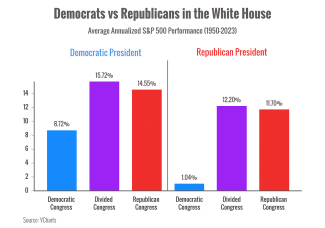
New presidential candidate? (What it could mean)
A lot has happened recently.
After weeks of gains, markets slid as investors took a step back from big technology stocks.1
At the same time, a global IT outage took major corporations offline across the world.
President Joe Biden withdrew from the election, injecting more uncertainty into the tight race.2
A shooter came close to assassinating Donald Trump at a campaign rally.3
Phew.
What could all this mean for investors? Let’s discuss.
Crowdstrike, a global IT outsourcing company, took millions of Windows devices offline with a bad update.
Despite causing hours and days of chaos for airlines, banks, hospitals, and other companies, the economic impact of the outage is likely to be muted.4
However, it shows just how interconnected and fragile our technology infrastructure can be.
Markets bounced back quickly from the tech-triggered slide.2
It’s pretty common for markets to recover from a slide when overall sentiment or fundamentals haven't shifted.
In this case, the quick correction was mostly concentrated in the tech sector and was related to investors shifting their positions away from some of the sector's biggest winners.
Let’s use this as a teachable moment:
One of the challenges of being a long-term investor is accepting down days and weeks.
Investors who panic and sell miss out on the strong market days that often follow.
While markets rebounded back quickly this time, that’s not guaranteed.
We’re expecting markets to remain volatile as investors position themselves ahead of major earnings reports and economic data.
We're watching and taking stock of data as it arrives.
What could a new Democratic presidential candidate mean for investors?
In the short term, extra uncertainty around the election could stoke volatility as traders revisit their bets.
However, in the medium to long term, the election isn’t likely to have much impact on markets at all - despite what the headlines might tell you.
The chart gives a quick look at how the S&P 500 performed when each party held the White House.
As you can see, markets grew regardless of which party held the presidency.5
And - markets did better with a divided Congress.
That’s likely because a legislative branch split between parties makes it harder to pass new tax laws or other legislation that could affect business performance.
Bottom line: market fundamentals haven’t significantly changed but we expect more volatility ahead.
We're watching the market and economic data closely. Don’t hesitate to reach out if you have any questions.
Sources:
1. https://finance.yahoo.com/news/asian-stocks-track-us-decline-224153088.html
5. https://get.ycharts.com/resources/blog/an-advisors-guide-to-elections-and-the-markets/
Chart sources: https://get.ycharts.com/resources/blog/an-advisors-guide-to-elections-and-the-markets/
Risk Disclosure: Investing involves risk including the potential loss of principal. No investment strategy can guarantee a profit or protect against loss in periods of declining values. Past performance does not guarantee future results.
This material is for information purposes only and is not intended as an offer or solicitation with respect to the purchase or sale of any security. The content is developed from sources believed to be providing accurate information; no warranty, expressed or implied, is made regarding accuracy, adequacy, completeness, legality, reliability, or usefulness of any information. Consult your financial professional before making any investment decision. For illustrative use only.
This information is not intended to be a substitute for specific individualized tax advice. We suggest that you discuss your specific situation with a qualified tax professional.

